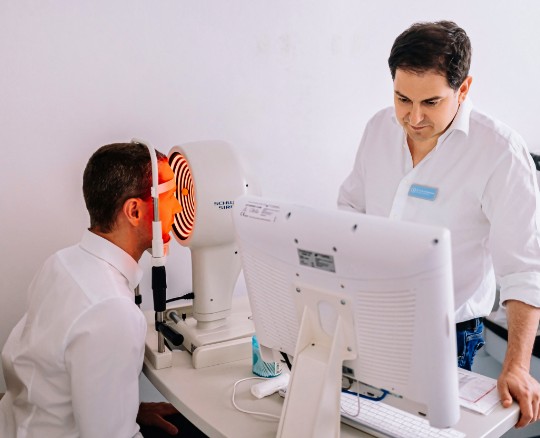Aufregung vor dem Augenlasern
Die meisten Menschen berichten von Aufregung vor einer Augen-OP. Ein Eingriff an den Augen löst häufig mulmige Gefühle aus –…
The good news first:
In Switzerland, the costs of eye lens implants are generally covered by health insurance if there is a medical necessity. This means that the treatment is necessary to treat a disease or injury that can lead to visual impairment or even blindness.
In some cases, there may also be aesthetic reasons for an eye lens implantation, such as the correction of presbyopia. In such cases, however, the costs are not usually covered by health insurance.
It is important to note that the exact conditions for reimbursement can vary from health insurance company to health insurance company. It is therefore advisable to find out in advance from your own health insurance company whether the costs of an eye lens implantation will be covered.
Lens implantation is an increasingly popular form of permanent eye correction. This is a procedure that is used as an alternative to laser eye surgery and in which multifocal lenses are implanted in the front part of the eye. The lens takes over the function that the human eye cannot perform and ensures clear focusing in the field of vision. As a result, vision becomes clearer and the person affected can see much better than before.
The procedure itself is usually quick and virtually painless, making it ideal for those who do not want to deal with long operations or the subsequent recovery time. It is also easy for patients to know which type of lens they should get, as there are several models that can be adapted to individual visual needs. In addition, patients report a significant improvement in their general vision after lens implantation. This means that glasses and contact lenses may no longer be necessary after the procedure, allowing patients to become less dependent on these aids and improve their quality of life!
Lens implantation is a safe and effective method of correcting refractive errors such as short-sightedness, long-sightedness and astigmatism. It is a surgical procedure in which an artificial intraocular lens (IOL) is inserted into the eye to replace the eye’s natural lens. In some cases, lens implantation can be beneficial for people who are not suitable for laser eye treatment. For example, if the patient’s cornea is too soft or could not be corrected with laser surgery, they can undergo this type of procedure instead.
Before implanting a lens, doctors consider several factors such as age and health to decide whether it is suitable for the patient. Lens implantation can be particularly beneficial for those whose refractive error is relatively stable over time – usually people between the ages of 18 and 45 – as it offers long-term vision correction that is not possible with normal laser correction. In addition, night vision is also improved so that glasses are no longer required even in the dark. All these benefits make it a great alternative for those who are not suitable for laser eye surgery for various reasons.
The quick check is a free, fast and effective procedure to determine the suitability of patients for a lens implant or laser eye surgery. It only takes 10 to 15 minutes and can be carried out in our practice or directly at our clinic. We advise you to make an appointment for the quick check beforehand to avoid waiting times when you arrive.
The preliminary examination also serves to assess suitability for eye surgery, but takes about an hour and costs CHF 290. A general eye examination and an emergency examination are so important that they are usually covered by health insurance. These examinations allow eye care professionals to detect potential eye problems before they become serious, allowing for preventative diagnosis, vision protection and treatment if necessary. The costs for such examinations depend on the individual case and the associated treatments; optional examinations such as an ophthalmoscopy may incur additional costs, but are covered by most health insurance companies.
It is important to note that the cost of general examinations need not be a cause for concern, but patients suffering from eye complications may benefit from more specialized treatments that may not be fully covered by their health insurance. If a patient requires these additional services, they should contact their GP or optician before making use of them. This gives them enough time to save money or apply for insurance if necessary.
This more thorough examination allows our experienced professionals to make sure that laser eye surgery or a lens implant is the best option for you. During the analysis, your eyes are assessed on several levels to ensure a safe, high-quality treatment solution tailored to your needs.
The importance of follow-up examinations after laser eye surgery or lens implantation cannot be overemphasized. At the eye clinic of Eyelaser CH, all follow-up examinations that are necessary within the first three months after the operation are included in the price, so that you do not have to worry about any additional costs. The typical follow-up examinations take place the day after the operation and one and three months after the procedure. These check-ups are essential to ensure that your eyes remain healthy and safe.
Regular monitoring of the healing process through such follow-up examinations can quickly detect abnormalities and enable immediate treatment. Without regular check-ups, underlying conditions could go unnoticed and worsen over time, meaning that problems are only discovered much later, when it is already too late for effective treatment. For this reason, we recommend that you take advantage of the obligatory follow-up examinations so that you can keep up to date with your progress after eye surgery.
Outpatient treatment for vision correction involves a procedure in which the existing lens is replaced with an artificial, multifocal intraocular lens. This procedure begins with anesthetic eye drops to avoid discomfort during the process. After applying the drops, the existing lens is carefully broken up at the edge of the cornea and then removed from the eye by suction. After removal, an artificial multifocal intraocular lens is then placed in its place using a small bullet-like device. Immediate results are not usually seen, but within 24 hours patients will notice an improvement in their vision, making this procedure convenient and quick compared to other types of treatment.
The benefits of this outpatient treatment include improved visual acuity and a larger field of vision as well as lower risks than with conventional laser correction surgery such as PRK or LASIK. Once treatment is complete, patients can benefit from significantly improved vision without needing special aftercare or opting for further surgery to optimize their results. Thanks to advanced technologies and these increasingly popular treatments, many people around the world have gained better vision without ever having to enter a hospital. This shows how far medical science has come.
The Eyelaser Clinic in Zurich offers a wide range of lens operations, including both medically indicated and lifestyle services. Medical indications for lens surgery include cataracts, where the natural lens of the eye has become cloudy due to age or disease. The doctors at the clinic specialize in carefully assessing each individual case and professionally removing the cataract and replacing it with an artificial intraocular lens (IOL).
In addition to the medically necessary treatments, the clinic also offers a range of lifestyle services to improve visual performance. Myopia patients can benefit from myopia surgery to reduce their need for glasses. Farsighted people can opt for farsightedness surgery to correct blurred vision and provide a more comfortable visual experience. All surgical procedures are performed safely in a sterile environment, using a variety of advanced techniques that promise great results without causing unnecessary discomfort or side effects.
We treat with implants:
Prices for lens surgery
Correction of high visual defects, presbyopia with advanced implants (prices/eye)
We offer you the option of a monthly installment payment that matches your contact lens costs, or you can pay the financing in 6 months with no down payment or interest. Our partner bank will be happy to advise you on the best solution for you.
– 3 installments within 6 months
Eyelaser offers financing options that allow you to pay for your laser eye surgery in 3 installments over a period of 6 months.
– Monthly financing with a loan
Our partner bank offers credit options to finance your laser eye surgery. Repayment can be made in monthly installments at a favorable interest rate of currently 6.6% for up to 5 years (12 months).
As already mentioned at the beginning, health insurance companies will cover the costs of treatment if it is medically necessary. However, to avoid any negative surprises, we advise you to discuss the therapy with your insurer in advance.
Laser eye surgery and lens implants are generally not covered by statutory health insurance, as this only has to reimburse the costs of medically necessary treatments. However, it could be argued that clear vision is part of basic human health and therefore the cost of lens implantation could be considered medically necessary. However, our specialization is in eye surgery and not in health policy.
In certain cases, health insurance companies may cover all or part of the costs of lens implantation.
During the ophthalmologic examination, we can check various criteria and prepare a clinical report.
If your health insurance does not cover the full cost of a procedure, you may be able to claim the expenses as an extraordinary burden against tax.
EyeLaser is a private practice and treatments are not covered by health insurance. It is advisable to contact your health insurance company before the procedure to clarify whether the costs will be covered. Your private health insurance may cover the treatment of visual defects in different ways.
Don’t forget to deduct the costs from your tax return. For all regulations in this regard, please consult a tax advisor.
Laser eye surgery in Zurich with leading Lasik surgeons: Gain visual freedom with our method for exceptional laser eye surgery.
Millions of people around the world have already freed themselves from glasses and contact lenses, but not all eyes are suitable for treatment. Book an assessment below and find out if you are suitable and which treatment can best help you:
Termin vereinbarenWatch the best patient videos on laser eye surgery
Get a thorough overview of everything you need to know to free yourself from glasses and contacts

Die meisten Menschen berichten von Aufregung vor einer Augen-OP. Ein Eingriff an den Augen löst häufig mulmige Gefühle aus –…

Angst vor dem Augenlasern? Fast alle Menschen fürchten sich vor einer Operation, selbst wenn es sich nur um einen winzigen…

Bei der Entscheidung, ob Ihre eigene Krankenkasse die Kosten für eine Augenlaseroperation übernimmt, ist zu beachten, dass die Krankenkassen leicht…
Discover our laser eye surgeons in the heart of Zurich

Things like age, eye shape, history and lifestyle make an eye treatment perfect for one person, but not another. Find out which treatment (if any) could free you from glasses and contacts
Take a quiz